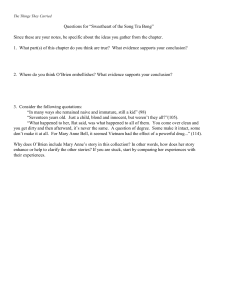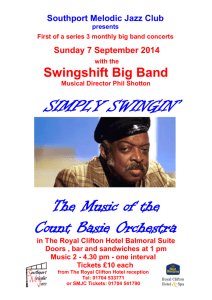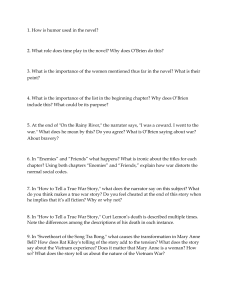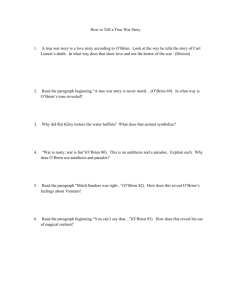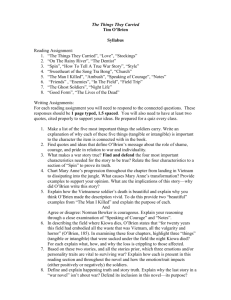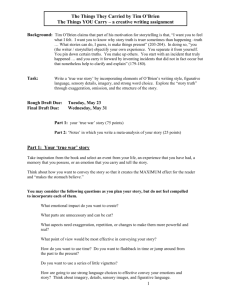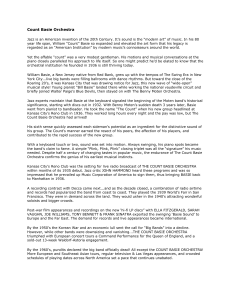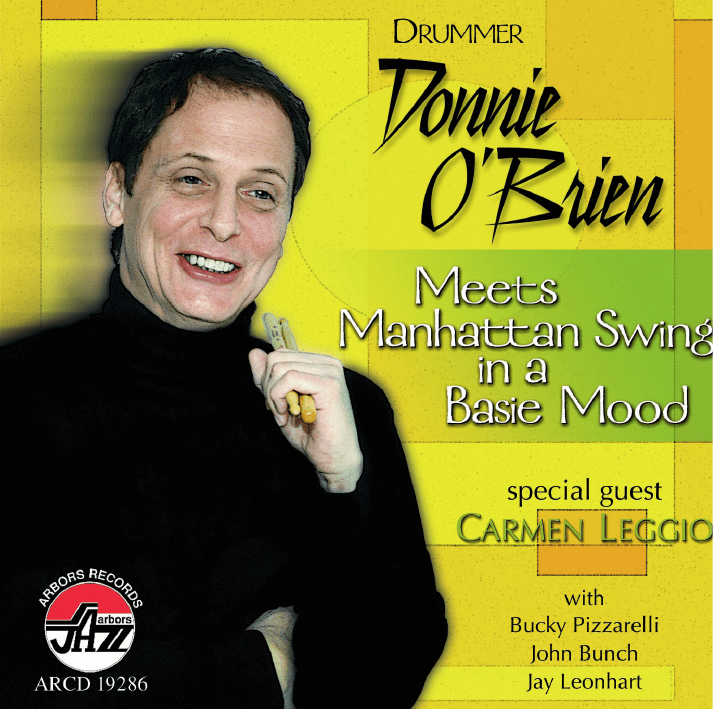
DRUMMER DONNIE O’BRIEN MEETS MANHATTAN SWING:
IN A BASIE MOOD • WITH SPECIAL GUEST CARMEN LEGGIO
Notes by Scott Yanow
Donnie O’Brien, a talented drummer who has worked regularly in the New
York area since the early 1970s, makes his long overdue recording debut on
In A Basie Mood. The genesis of this set actually took place a few decades
ago. “I’ve known Bucky Pizzarelli since I was a teenager,” says the drummer.
“I used to sit in with him occasionally and we’ve kept in touch through the
years. I went to see him one night a year ago when he was playing in the city.
I asked if he would like to make a demo recording with me, he agreed, and
it ended up turning out so good that Bucky thought that it’d be a good idea
to let Mat Domber of Arbors have a listen. That is how this recording came
about.”
O’Brien’s playing with his well-known sidemen on this enjoyable CD makes
it obvious that he has spent many years developing his own approach to performing swinging jazz. He was born and raised in New York, starting on the
drums at a very young age. “My uncle played the drums although not professionally. He had a beautiful drum set and, as a bit of a joke, he sat me down
at them when I was three and I just started playing. I took to the drums right
away and had a lot of fun with it, surprising everyone. By the time I was
four, I had my own set of drums and was playing to records, including some
rock and roll and a lot of swinging jazz including Benny Goodman, Harry
James, Count Basie, Duke Ellington and Lionel Hampton. There was always
a lot of music playing around the house.”
Donnie’s mother took him to a drum teacher when he was five. The instructor gave the youth a listen and concluded that it would be best if he just
continued doing what he was doing, playing to records and learning from the
music of other drummers. As an extra incentive, he gave Mrs. O’Brien tickets
to a Gene Krupa concert. “My mother took me to the concert and we sat in
the front row which was great. We were able to go backstage during intermission to get his autograph. When he found out that I was learning drums, he
told me to never stop playing. Gene Krupa picked me up, put me on a table
and talked to me for awhile, and we fooled around with the sticks. He was
such a nice man.”
The concert inspired O’Brien and he played constantly as he grew up, having his own band by the time he was in grammar school. Another encounter
with a veteran drummer made a major impact. “When I was 17 or 18, there
was a piano player in Westchester who took me under his wing. He talked to
Mel Lewis about me a bit, I met Mel and he kind of adopted me. I used to
go to his place and I was always made welcome. I remember Mel telling me
that I didn’t need drum lessons; I just needed a talking to. What he meant
was that I needed to settle down and become a musician rather than just a
soloist or a showman. He also made me feel that I had a real shot at becoming a drummer.”
By that time, Donnie O’Brien was already working as a musician. “I always
wanted to be a musician, ever since I was a kid. When I was 18 I was playing
in a club and Joe Franklin happened to be there. He put me on his television
show, playing a seven or eight minute drum solo. That was a highlight of my
early career.” When work became a bit sparse in New York, O’Brien spent a
period gigging in New Orleans, starting with playing at trumpeter Al Hirt’s
club.
“Al Hirt was very nice and invited me to a rehearsal in his place. I was soon
hired for some other bands including on the riverboat Natchez and for many
clubs, working seven nights a week and some afternoons. Although I wasn’t a
dixieland player and had to learn all of those tunes, I worked a great deal during my two years in New Orleans.”
Since returning to New York, O’Brien (who is now in his late forties) has led
his own small groups, playing at clubs, weddings, private parties and a wide
variety of jazz gigs. “ I admire a lot of drummers but I just love the feel of
straight ahead swinging jazz because I’ve always liked the Count Basie band so
much.”
It was natural that O’Brien would utilize the tasteful guitar playing of Bucky
Pizzarelli on his debut recording. Pizzarelli, who celebrated his 77th birthday
in 2003 at the March of Jazz in Clearwater Beach, Florida, has performed
in a countless number of settings since the 1940s when he was a member of
Vaughn Monroe’s orchestra. Pizzarelli has long been a master of the sevenstring guitar and adds taste and swing to every session in which he appears.
He spent long periods as a member of the staffs of NBC (starting in 1952)
and ABC (when he switched in 1964) but always found time to play jazz.
Among his more notable associations have been Benny Goodman, guitarist
George Barnes (with whom he co-led a duo), Stephane Grappelli, Zoot Sims
and Bud Freeman, not to mention his sons guitarist-singer John and bassist
Martin Pizzarelli.
It was a particular thrill for O’Brien to get John Bunch on piano. “John
was on one of my favorite Buddy Rich albums, Swinging New Big Band
Band,”
remembers O’Brien. “When I was a kid that record was the Bible for me; I
wanted to play like Buddy Rich.” One of the top modern swing pianists for
quite some time, John Bunch tends to be underrated but never by his fellow
musicians. At 81, he remains in his musical prime, having played piano for
70 years. Some of his more high-profile gigs have been with the orchestras of
Woody Herman (1956-1957), Benny Goodman, and Maynard Ferguson plus
extensive work with the Al Cohn/Zoot Sims Quintet, Gene Krupa’s quartet (1961-1964), Rich’s big band in 1966 and Tony Bennett (1966-1972).
Bunch, who in recent times has often played with the top newer swing musicians, has also worked with Bucky Pizzarelli as one-third of Manhattan Swing,
also known as New York Swing.
The third part of Manhattan Swing is bassist Jay Leonhart, who is 62.
Leonhart, who has gained a strong reputation as a witty lyricist and an occasional singer, has played bass with a who’s who of mainstream swing since
the early 1960s. Along the way he has uplifted the music of such notables
as Buddy Morrow (1961), Mike Longo, Marian McPartland, Jim Hall, Phil
Woods, Gerry Mulligan, Lee Konitz, Don Sebesky and Louie Bellson among
many others. He is married to singer Donna Leonhart and his children
include singer Carolyn Leonhart and trumpeter Michael Leonhart.
At 75, Carmen Leggio deserves much greater recognition. Leggio, who is
heard here exclusively on tenor, is also a fine soloist on alto. His style has
sometimes stretched beyond mainstream swing to bop and hard bop and his
tenor tone (influenced by Coleman Hawkins) and his playing are quite individual. He describes Artie Shaw as his main influence. Leggio’s significant
associations include Terry Gibbs, Benny Goodman, Gene Krupa, Buddy
Rich, Maynard Ferguson’s big band (1958-59), Woody Herman and the
Thad Jones/Mel Lewis Orchestra.
“Bucky had the idea of us playing in a Basie style,” remembers O’Brien “and
I jumped on that immediately. I always loved the early Count Basie band so
naturally in this setting I couldn’t help but think of Jo Jones (and the Jones
influence is heard in Donnie’s playing.) I remember seeing him one time at a
jazz festival when I was a kid. All of these other top drummers were playing
including Max Roach, Mel Lewis and Louie Bellson. They all sounded great
but Jo Jones came out and just played his hi-hat with brushes and sticks; that
was incredible.”
For In A Basie Mood, nine songs associated with the Count Basie big band
of 1936-45 were picked by the musicians. Although there is only one horn
heard along with the four-piece rhythm section, the music is very much in
the Basie vein with the musicians sounding relaxed, leaving space for each
other and swinging lightly. “That whole day was a dream come true for me.
Although I enjoy playing drum solos, it just did not seem to fit with this
record. I instead saw my role as playing as tastefully as I could, being supportive of these great players. I sought to play really good time and embellish
what was going on around me.”
O’Brien succeeded at his goal, adding swing and momentum to the music
while playing quietly and with great subtlety. The set begins with Count
Basie’s theme song, One O’Clock Jump. On this and all of the other songs
on the date, John Bunch manages to play very much in the Basie style while
not losing or watering down his own musical personality, which leans more
towards Teddy Wilson. Carmen Leggio adds his lazy yet warm-sounding
tenor, hinting at Herschel Evans and Buddy Tate while occasionally looking
towards Lester Young for inspiration. Bucky Pizzarelli both plays rhythm guitar a la Freddie Greene and takes occasional solos that fit in perfectly with the
swing era repertoire while Jay Leonhart creates supportive bass lines that work
well with both Pizzarelli’s chordings and the quiet drumming of O’Brien.
All of the songs from the date will be quite familiar to Count Basie fans but,
while paying tribute to the past, they are creative within the boundaries of
the music. Blue And Sentimental, which originally had Herschel Evans’
most famous solo, has a fine statement from Leggio in his own style, with
Bunch often hinting at the original record. Written in 1925, I Never Knew
became a jam session favorite during the swing era and was recorded with the
Basie big band in 1940 but was given its definitive rendition by Lester Young
in a quartet with pianist Johnny Guarnieri in 1943. Robbins’ Nest, which
has long been identified with tenor-saxophonist Illinois Jacquet (who had a
stint with Basie in the mid-40s), is the longest performance on the disc at
just over eight minutes. Pizzarelli combines both bluish single-note lines and
sophisticated chords in his solo and there are also fine statements from Bunch,
Leonhart and Leggio.
Lester Leaps I and Body And Soul are associated with the two great prebop tenors, Lester Young and Coleman Hawkins. Leggio is up for the challenge, romping on Lester Leaps In (which has the fastest tempo of the set)
and making a warm yet exploratory statement on Body And Soul. Moten
Swing, a piece that the young Count Basie played while working as a sideman with the Bennie Moten Orchestra, has always been in the Basie book.
Its attractive chord changes are taken from You’re Driving Me Crazy and
have consistently inspired swinging solos, including the ones heard here by
Pizzarelli, Leggio and Bunch. Jive At Five has Leonhart introducing the
melody (accompanied by rhythm guitar) and after the solos, Leonhart takes
the song out. Bye Bye Blues features the only drum solo of the project, with
O’Brien showing his mastery of brushes, playing part of the song as a duet
with Pizzarelli’s chordal guitar.
Of In A Basie Mood, O’Brien says “I grew up with a lot of these people
being my heroes so it was a thrill to play and record with them. I love the
way Bucky’s comping really captures the Basie feel, and Carmen’s playing on
Body And Soul is wonderful. Things really clicked that day.”
For the future, the drummer says “My main goal in music is simply to keep
on playing the music I love with swinging groups.” On evidence of his
debut, Donnie O’Brien should be in great demand for other all-star mainstream swing dates in the future. Drummers who can play with this much
subtlety yet with plenty of quiet drive are always rare and valuable assets.
–Scott Yanow, June, 2003
(Scott Yanow, who has penned over 300 liner notes, is the editor of The All
Music Guide to Jazz and author of eight jazz books including Trumpet Kings,
Swing Classic Jazz and the upcoming Jazz On Film.)
Swing,
THE CREDITS
Producer:
Executive Producers:
Recorded:
Recorded, Mixed and Mastered by:
Cover Photo:
Cover Design:
Donnie O’Brien
Rachel and Mat Domber for Arbors Records, Inc.
October 18, 2002 at Nola Studios, NYC
Jim Czak assisted by Bill Moss
Derek
Luke Melton
Donnie O’Brien dedicates this recording to his grandmother, Muriel Hansen. Special thanks to
his wife Louise for her patience and understanding and to his son Timothy, the light of his life.
Additional thanks to Bucky Pizzarelli, without whom this record would not have been made,
and to his son John who stopped by to add encouragement and sat in on Lester Leaps In.
NEW FROM ARBORS RECORDS
The Kenny Davern Quartet at the Mill Hill Playhouse ARCD 19296
Professor Peter O’Brien: Jazz Piano of a Celtic Soul • Arbors Piano Series, Vol. 12 ARCD 19295
The Michiko Ogawa Trio: It’s All About Love ARCD 19294
Ralph Sutton: Wondrous Piano – The Private Family Recordings – 1961 ARCD 19297
The Kings of Jazz featuring Kenny Davern: Live in Concert 1974 ARCD 19267
Dave Frishberg: Do You Miss New York? Live at Jazz at Lincoln Center ARCD 19291
Skitch Henderson and Bucky Pizzarelli: Legends ARCD 19285
Daryl Sherman: A Hundred Million Miracles ARCD 19279
Celebrating Bix! The Bix Centennial All Stars Celebrate His 100th Birthday ARCD 19271
Flip Phillips Celebrates His 80th Birthday At The March of Jazz 1995 ARCD 19281
Ruby Braff and Dick Hyman: America, The Beautiful ARCD 19269
WRITE ARBORS RECORDS FOR A COMPLETE CATALOG
Arbors Records, Inc., 2189 Cleveland Street, Suite 225, Clearwater, FL 33765
Phone: (727) 466-0571 Fax: (727) 466-0432 Toll free: (800) 299-1930
E-mail: mrd@gate.net Internet address: http://www.arborsrecords.com
Drummer Donnie O’Brien Meets
Manhattan Swing: In a Basie Mood
ARCD 19286
With Manhattan Swing (Bucky Pizzarelli, John Bunch and Jay Leohart)
and Special Guest Carmen Leggio
Donnie O’Brien, a talented drummer who has worked regularly in the New York
area since the early 1970s, makes his recording debut on this meeting with Bucky
Pizzarelli, John Bunch and Jay Leonhart, together with saxophone great, Carmen
Leggio. The music is very much in a Basie vein with the musicians sounding relaxed,
leaving space for each other and swinging lightly, with O’Brien playing with much
subtlety and yet with plenty of quiet drive, making for a most enjoyable CD.
1. One O’Clock Jump
(Count Basie) (5:53)
2. Blue and Sentimental (Count Basie,
Mack David, Jerry Livingston) (4:37)
3. I Never Knew (Gus Kahn,
Ted Fio Rito) (5:49)
4. Robbins Nest (Illinois Jacquet, Bob
Russell, Charles P. Thompson) (8:10)
5. Lester Leaps In
(Lester Young) (6:01)
6. Body and Soul (Edward Heyman,
Robert Sour, Frank Eyton, Johnny
Green) (7:27)
7. Moten Swing (Benny Moten,
Buster Moten) (6:50)
8. Jive at Five (Count Basie, Harry
“Sweets” Edison) (5:12)
9. Bye Bye Blues (Bert Lown,
Chauncey Grey, Fred Hamm,
Dave Bennett) (4:11)
Donnie O’Brien: Leader, Drums • Carmen Leggio: Tenor Sax
Bucky Pizzarelli: Guitar • John Bunch: Piano
Jay Leonhart: Bass • John Pizzarelli: Guitar (5)
Produced by ARBORS RECORDS, INC.
© 2003 Arbors Records, Inc. All rights reserved. Unauthorized duplication is a violation of applicable law.

